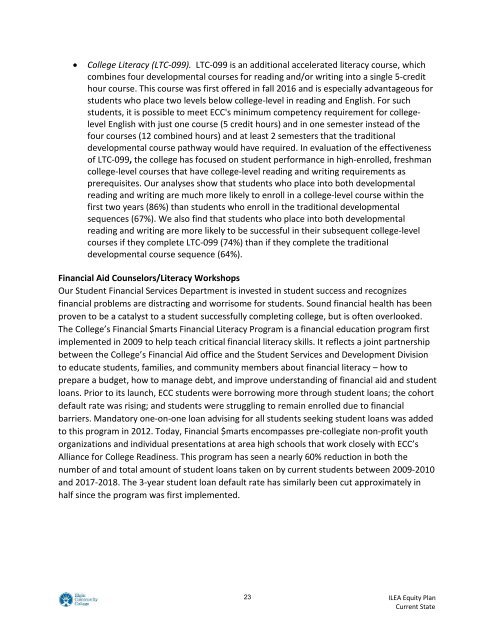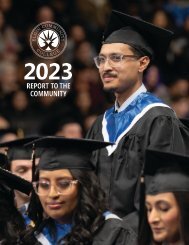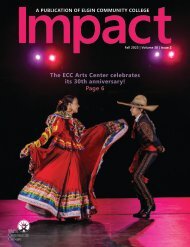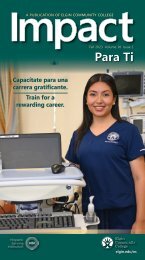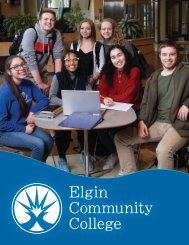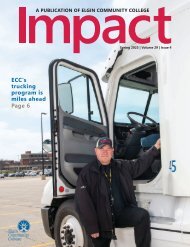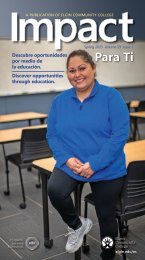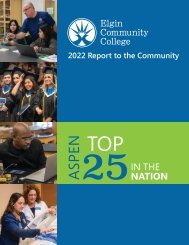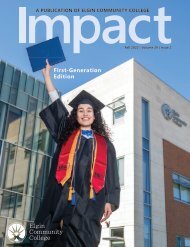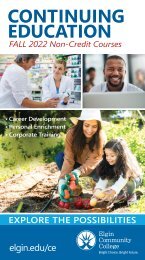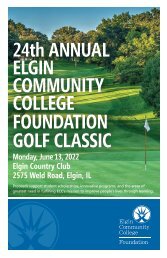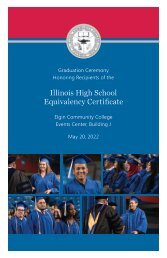ILEA Equity Plan | Elgin Community College (ECC)
There are wide and persistent gaps in college completion rates in Illinois, especially among students of color and low-income students. After an in-depth analysis of our institutional data, Elgin Community College (“ECC” or “the College” or “we” or “our”) has developed an Equity Plan containing annual growth targets for which progress updates will be shared publicly over the next five years. Our Equity Plan reflects the unique characteristics of our institution. For example, ECC is designated as a Hispanic Serving Institution by the US Department of Education, with just over 42% of the students identifying as Latinx or Hispanic. Also, the district served by ECC is widely diverse in terms of income and educational attainment. We will identify the obstacles students face and develop programs and policies that break down unnecessary college graduation barriers. Along with our fellow colleges, in the Partnership for College Completion organization, with this Illinois Equity in Attainment (“ILEA”) plan, we pledge to close the completion gaps by 2025.
There are wide and persistent gaps in college completion rates in Illinois, especially among students of color and low-income students. After an in-depth analysis of our institutional data, Elgin Community College (“ECC” or “the College” or “we” or “our”) has developed an Equity Plan containing annual growth targets for which progress updates will be shared publicly over the next five years. Our Equity Plan reflects the unique characteristics of our institution. For example, ECC is designated as a Hispanic Serving Institution by the US Department of Education, with just over 42% of the students identifying as Latinx or Hispanic. Also, the district served by ECC is widely diverse in terms of income and educational attainment. We will identify the obstacles students face and develop programs and policies that break down unnecessary college graduation barriers. Along with our fellow colleges, in the Partnership for College Completion organization, with this Illinois Equity in Attainment (“ILEA”) plan, we pledge to close the completion gaps by 2025.
Create successful ePaper yourself
Turn your PDF publications into a flip-book with our unique Google optimized e-Paper software.
• <strong>College</strong> Literacy (LTC-099). LTC-099 is an additional accelerated literacy course, which<br />
combines four developmental courses for reading and/or writing into a single 5-credit<br />
hour course. This course was first offered in fall 2016 and is especially advantageous for<br />
students who place two levels below college-level in reading and English. For such<br />
students, it is possible to meet <strong>ECC</strong>'s minimum competency requirement for collegelevel<br />
English with just one course (5 credit hours) and in one semester instead of the<br />
four courses (12 combined hours) and at least 2 semesters that the traditional<br />
developmental course pathway would have required. In evaluation of the effectiveness<br />
of LTC-099, the college has focused on student performance in high-enrolled, freshman<br />
college-level courses that have college-level reading and writing requirements as<br />
prerequisites. Our analyses show that students who place into both developmental<br />
reading and writing are much more likely to enroll in a college-level course within the<br />
first two years (86%) than students who enroll in the traditional developmental<br />
sequences (67%). We also find that students who place into both developmental<br />
reading and writing are more likely to be successful in their subsequent college-level<br />
courses if they complete LTC-099 (74%) than if they complete the traditional<br />
developmental course sequence (64%).<br />
Financial Aid Counselors/Literacy Workshops<br />
Our Student Financial Services Department is invested in student success and recognizes<br />
financial problems are distracting and worrisome for students. Sound financial health has been<br />
proven to be a catalyst to a student successfully completing college, but is often overlooked.<br />
The <strong>College</strong>’s Financial $marts Financial Literacy Program is a financial education program first<br />
implemented in 2009 to help teach critical financial literacy skills. It reflects a joint partnership<br />
between the <strong>College</strong>’s Financial Aid office and the Student Services and Development Division<br />
to educate students, families, and community members about financial literacy – how to<br />
prepare a budget, how to manage debt, and improve understanding of financial aid and student<br />
loans. Prior to its launch, <strong>ECC</strong> students were borrowing more through student loans; the cohort<br />
default rate was rising; and students were struggling to remain enrolled due to financial<br />
barriers. Mandatory one-on-one loan advising for all students seeking student loans was added<br />
to this program in 2012. Today, Financial $marts encompasses pre-collegiate non-profit youth<br />
organizations and individual presentations at area high schools that work closely with <strong>ECC</strong>’s<br />
Alliance for <strong>College</strong> Readiness. This program has seen a nearly 60% reduction in both the<br />
number of and total amount of student loans taken on by current students between 2009-2010<br />
and 2017-2018. The 3-year student loan default rate has similarly been cut approximately in<br />
half since the program was first implemented.<br />
23<br />
<strong>ILEA</strong> <strong>Equity</strong> <strong>Plan</strong><br />
Current State


